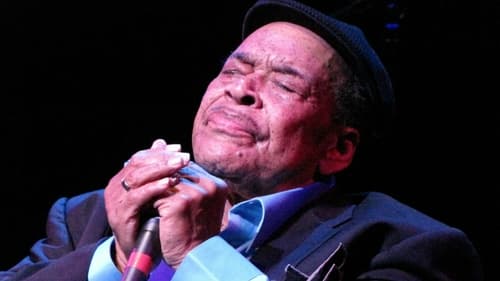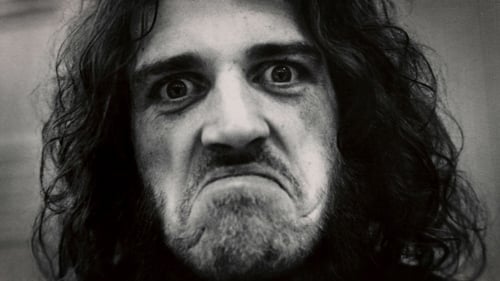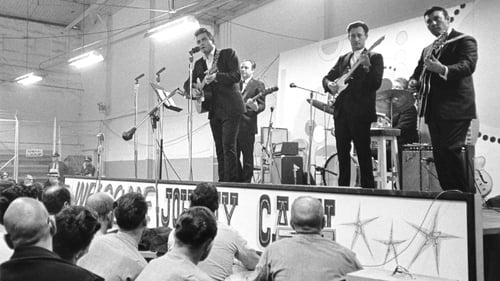
Producer
The story of James Cotton, harmonica powerhouse, whose music shaped blues and rock. Orphaned at 9, Cotton’s life tracks America’s history—from the post-depression cotton fields of the Mississippi Delta to being mentored by the original Delta bluesmen, to Chicagoland’s artistic reinvention to the live music scene in Austin, Texas.

Director
The story of James Cotton, harmonica powerhouse, whose music shaped blues and rock. Orphaned at 9, Cotton’s life tracks America’s history—from the post-depression cotton fields of the Mississippi Delta to being mentored by the original Delta bluesmen, to Chicagoland’s artistic reinvention to the live music scene in Austin, Texas.

Cinematography
The story of the actor who plays Bill W., the founder of AA, on his own personal journey of recovery.

Producer
The story of the actor who plays Bill W., the founder of AA, on his own personal journey of recovery.

Producer
Puerto Rico, the last relic of colonization in the western hemisphere, has been a dependent territory of the USA since 1917. Los Macheteros and one of its leaders Juan Segarra have been fighting for its full independence for many decades.

Director
Puerto Rico, the last relic of colonization in the western hemisphere, has been a dependent territory of the USA since 1917. Los Macheteros and one of its leaders Juan Segarra have been fighting for its full independence for many decades.

Director of Photography
The turbulent life of soul and blues singer, the late Joe Cocker. A former gas fitter from Sheffield, catapulted to world stardom in 1969 at Woodstock with his legendary performance of the Beatles song, "A Little Help from My Friends". But in the early 1970s, Joe Cocker's inner demons nearly killed him. Overcoming his struggles with alcohol and drugs, he rebuilt his reputation as "one of the great primal rock and roll vocalists of all time" (Billy Joel's description). The film mixes Joe Cocker's own words, with rare archive. His wife (Pam Cocker) & family, friends and the legendary songwriters and musicians he collaborated with, tell Joe Cocker's story. The film has raw, historic, electric performance footage throughout. Extensive interviews of key people through his life include: Pam Cocker, Ben Fong-Torres (Rolling Stone magazine editor), Randy Newman, Jimmy Webb, Billy Joel, Rita Coolidge, Deric Dyer, Glyn Johns, and numerous others.

Director of Photography
How does a nation slip into war? Dateline-Saigon profiles the controversial reporting of five Pulitzer Prize-winning journalists -The New York Times' David Halberstam, the Associated Press' Malcolm Browne, Peter Arnett, and legendary photojournalist Horst Faas, and UPI's Neil Sheehan -- during the early years of the Vietnam War as President John F. Kennedy is secretly committing US troops to what is initially dismissed by some as 'a nice little war in a land of tigers and elephants.' 'When the government is telling the truth, reporters become a relatively unimportant conduit to what is happening,' Halberstam tells us. 'But when the government doesn't tell the truth, begins to twist the truth, hide the truth, then the journalist becomes involuntarily infinitely more important.'

Producer
How does a nation slip into war? Dateline-Saigon profiles the controversial reporting of five Pulitzer Prize-winning journalists -The New York Times' David Halberstam, the Associated Press' Malcolm Browne, Peter Arnett, and legendary photojournalist Horst Faas, and UPI's Neil Sheehan -- during the early years of the Vietnam War as President John F. Kennedy is secretly committing US troops to what is initially dismissed by some as 'a nice little war in a land of tigers and elephants.' 'When the government is telling the truth, reporters become a relatively unimportant conduit to what is happening,' Halberstam tells us. 'But when the government doesn't tell the truth, begins to twist the truth, hide the truth, then the journalist becomes involuntarily infinitely more important.'

Director
In 1915, Boston-based African American newspaper editor and activist William M. Trotter waged a battle against D.W. Griffith’s technically groundbreaking but notoriously Ku Klux Klan-friendly The Birth of a Nation, unleashing a fight that still rages today about race relations, media representation, and the power and influence of Hollywood. Birth of a Movement, based on Dick Lehr's book The Birth of a Movement: How Birth of a Nation Ignited the Battle for Civil Rights, captures the backdrop to this prescient clash between human rights, freedom of speech, and a changing media landscape.

Director
Filmed largely in Lowell and Lawrence over four years, Beyond the Wall is a raw and honest chronicle of one man’s efforts to help former convicts stay on the straight and narrow, away from the needle that sent them spiraling into prison.

Camera Operator
The story of young, brilliant African-American Anita Hill who accuses the Supreme Court nominee Clarence Thomas of unwanted sexual advances during explosive Senate Hearings in 1991 and ignites a political firestorm about sexual harassment, race, power and politics that resonates today.

Director

Director
Cash's concert at Folsom State Prison in California in January 1968 touched a raw nerve in the American psyche and made him a national hero at a troubled time in American history. Using the stark images of rock photographer Jim Marshall, graphic techniques, archive footage and interviews with Merle Haggard, Cash's daughter Rosanne, band members Marshall Grant and WS 'Fluke' Holland, alongside former inmates of the prison, the film documents this explosive concert, the live album that followed and a transformative moment in the lives of Cash, the inmates of Folsom Prison and the American nation in the troubled year of 1968.

Executive Producer
Norman Porter, a convicted double murderer from Massachusetts, served 25 years in prison before escaping to Chicago where he spent the next two decades living under the name JJ Jameson. He was apprehended in 2005, thanks to a relentless police investigation, just after being named Chicago’s “Poet of the Month.” The film interweaves varying perspectives on an elusive and enigmatic persona, from the eccentric characters living in the heart of Chicago’s beatnik-artist community, to the victims’ embittered families in Boston, and the vigilant officers behind the 20-year hunt for a killer.

Director
SCARRED JUSTICE: THE ORANGEBURG MASSACRE 1968 brings to light one of the bloodiest tragedies of the Civil Rights era after four decades of deliberate denial. The killing of four white students at Kent State University in 1970 left an indelible stain on our national consciousness. But most Americans know nothing of the three black students killed at South Carolina State College in Orangeburg two years earlier. This scrupulously researched documentary finally offers the definitive account of that tragic incident and reveals the environment that allowed it to be buried for so long. It raises disturbing questions about how our country acknowledges its tortured racial past in order to make sense of its challenging present. (Kanopy)

Producer
Most people don't think about singing when they think about revolutions. But song was the weapon of choice when, between 1986 and 1991, Estonians sought to free themselves from decades of Soviet occupation. During those years, hundreds of thousands gathered in public to sing forbidden patriotic songs and to rally for independence. "The young people, without any political party, and without any politicians, just came together ... not only tens of thousands but hundreds of thousands ... to gather and to sing and to give this nation a new spirit," remarks Mart Laar, a Singing Revolution leader featured in the film and the first post-Soviet Prime Minister of Estonia. "This was the idea of the Singing Revolution." James Tusty and Maureen Castle Tusty's "The Singing Revolution" tells the moving story of how the Estonian people peacefully regained their freedom--and helped topple an empire along the way.

Director of Photography
Documentary covering the case of Mumia Abu-Jamal, a black nationalist and journalist in Philadelphia, Pennsylvania, convicted of killing a Philadelphia police officer and sentenced to death in a trial marked by controversial prosecutorial and defense tactics and charges of racism.

Producer
This compelling and thought-provoking documentary provides riveting portraits of a diverse group of six men who once were women and chose to change their gender. The award-winning film is an unforgettable story of self-discovery and challenges all of us to re-examine the foundations of our ideas and feelings about gender, sexuality, and identity.

Director
This compelling and thought-provoking documentary provides riveting portraits of a diverse group of six men who once were women and chose to change their gender. The award-winning film is an unforgettable story of self-discovery and challenges all of us to re-examine the foundations of our ideas and feelings about gender, sexuality, and identity.

Director
A documentary chronicling the pioneering efforts of black filmmaker William D. Foster in the early years of the industry and Oscar Micheaux's controversial impact on the subsequent "race movies".

Director
A documentary dedicated to the bluegrass standard "Orange Blossom Special" and Ervin T. Rouse, the fiddle virtuoso who composed the tune. Includes performances by Johnny Cash, Bela Fleck, Charlie Daniels, and String Cheese Incident.



















